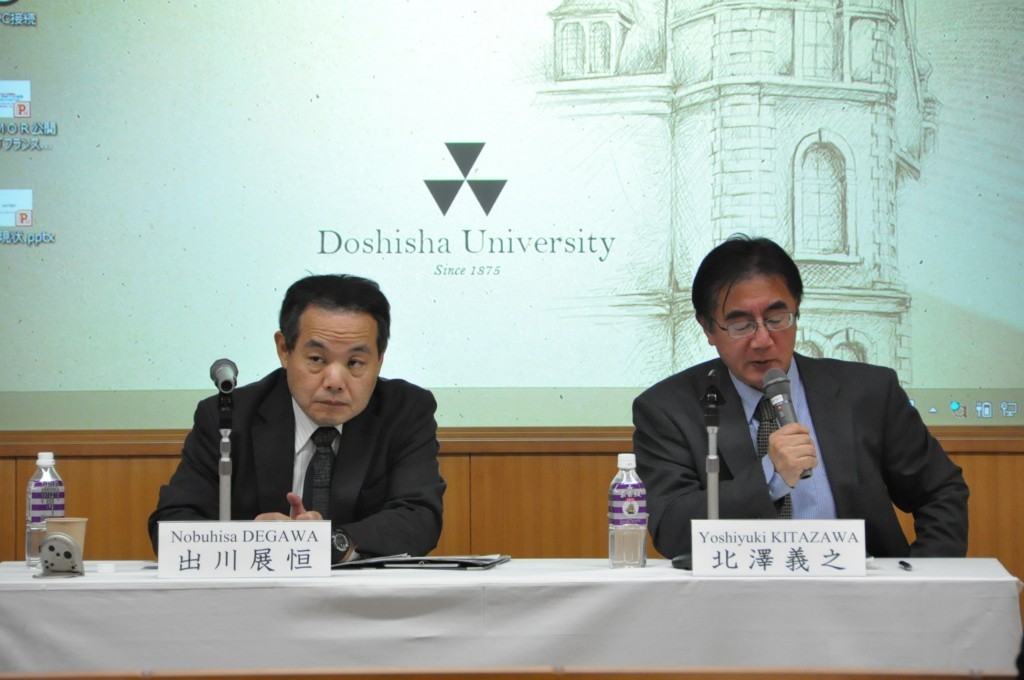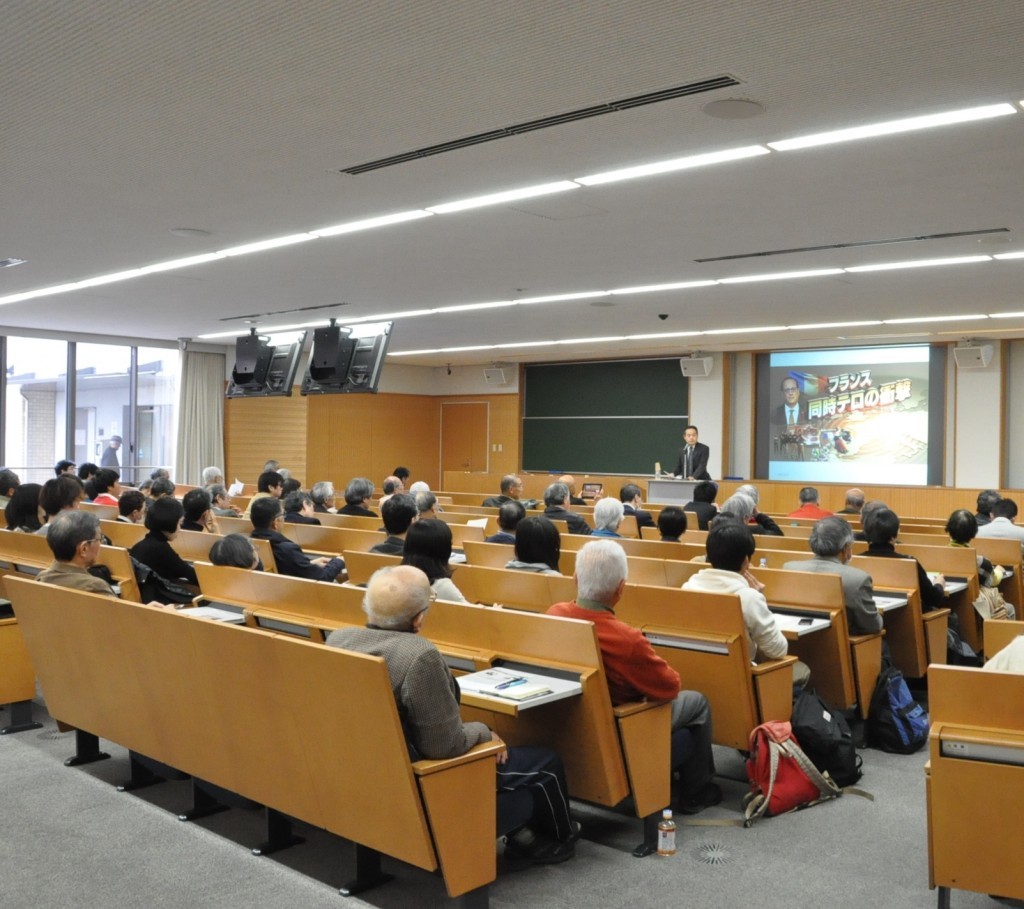Center for Interdisciplinary Study of Monotheistic Religions(CISMOR)Doshisha University
> Public Lectures > Seek Solutions to End the War on TerrorPublic Lectures
Seek Solutions to End the War on Terror
| Date: |
2015/12/05 13:30-15:30 |
|---|---|
| Place: | Room RY107. Ryoshinkan, Imadegawa Campus, Doshisha University |
| Lecture: |
1. Mr. Nobuhisa Degawa (Senior Commentator, News Commentators Division, Japan Broadcasting Corporation ) 2. Prof. Yoshiyuki Kitazawa ( Kyoto Sangyo University) |
| Summary: | |
|
First, Mr. Degawa presented a lecture concerning the threat of IS and responses to this threat. During coordinated terrorist attacks that occurred on the night of November 13, 2015 in Paris, explosions and gunfire broke out in eight locations over a period of approximately 30 minutes; a total of 130 people died as a result. A statement issued by IS explained that "we have struck the heart of France, which carries the crusader flag," and warned that "attacks will continue in the future" due to the military operations of France against IS. The size of the publicity effect in carrying out a terrorist attack in the international city of Paris, the abundance of frustrated second- and third-generation Islamic immigrants in French society, and free movement of persons in countries in Schengen Area are all factors in this terrorist attack. The ringleader was a Belgian national of Moroccan descent who frequently appeared in the magazines published by IS; he played a central role in luring young Europeans and coordinating attacks in foreign nations. The presence of networks in European nations such as France and Belgium connected to IS has emerged. In 2003, following the Iraq War, IS began as the Iraqi branch of the international terrorist organization Al-Qaeda. In 2011, during the so-called "Arab Spring," it expanded its activities as Syria fell into civil war. Due to differences in views, IS later split with Al-Qaeda, and, in June 2014, the organization conquered Mosul in Iraq, unilaterally declaring the region in Syria and Iraq to be the "Islamic State." Differing from traditional terrorist organizations, IS placed emphasis on the acquisition and expansion of territory; however, following military action by the US-led coalition of the willing, the areas controlled by IS have been shrinking. For this reason, IS was forced to shift strategies and is thought to be working to catch up by carrying out large-scale terrorist attacks in Paris and around the world. IS has ample sources of funding, for example, the smuggled oil that was looted from IS-controlled areas, the collection of "taxes," and ransom money from kidnapping. It has also made full use of information technology to attract 20,000 to 30,000 foreign fighters from more than 100 countries around the world. Of these, 10% to 30% have already left Iraq and Syria to return to their home countries. All of the 65 organizations and countries that have participated in the coalition of the willing are considered to be enemies of IS and, therefore, a potential target of terrorism. As Japan is a participant in the coalition of the willing, there is a need to strengthen counter-terrorism measures ahead of the upcoming G7 summit and the Olympics. The key points for future counter-terrorism measures are as follows: 1) international collaboration and coordination, 2) containment of IS, and 3) conclusion of the Syrian civil war. Thus, it is necessary to consider terrorism from these three perspectives. Military operations only treat the symptoms, and it is more important to devote efforts to cut off the flow of combatants, funds, and weapons to IS. To eliminate the "vacuum of power" in which IS governs and operates, it is essential to bring an end to the civil war in Syria, but the realization of a Syrian peace plan that the United States and Russia can agree to is not easy. He concluded by noting that the rapidly increasing Syrian refugees and internally displaced people are exposed to a serious humanitarian crisis, and it is necessary for the international community to be united in the cause of saving as many people as possible. Second, Prof. Kitazawa presented a lecture on the historical flow of extremism in Islam and politics. In examining the globalization of Islamic extremists, the Iranian Islamic Revolution must be first considered. This led to the US viewing Islam as dangerous and to the formation of a strategy to tackle the issue. Simultaneously, the Soviet–Afghan War broke out. The US indirectly supported Muslims to participate in the resistance movement against the Soviet intervention, creating a situation in which Islamic students were active in taking up weapons. In essence, at that time, the US took a contradictory position: while the US was wary of Islam, it also supported it. In Islam, the Prophet Muhammad, who was a religious leader, was also a political leader during his lifetime, and this tradition continued with the orthodox caliphate. This era later came to be regarded by Islamism as the ideal period of the union of religion and politics. Although free interpretation of Islamic law in Sunni Islam stopped in the 9th century, Ibn Taymiyyah did not comply with the policy, and advocated a restoration of the original form of Islam. The sultans of the Ottoman Empire assumed the function of the caliphs, but by the 12th century, the influence of the caliphs was lost. Subsequently, the effects of European imperialism led to the need for a reinterpretation of Islam to counter such imperialism, and Wahhabism appeared, calling for purification and reform of Islam. The Salafi doctrine also developed primarily in Egypt. In 1924, Turkey became a republic and abolished the caliphate; the national constitution mandates a clear separation between Islam and politics. Egypt was officially independent but was essentially under mandate; therefore, the Muslim Brotherhood was founded by Hassan al-Banna with the aims of breaking free from British rule, independence, and the liberation of the entire Islamic world. Initially, nationalism and Islamism in anti-imperialism were cooperative, but various conflicts later developed between the two. Furthermore, Saudi Arabia claims that Islam is the core value of the Middle East and the base of society; therefore, it has funded mosques and Islamic schools in various locations. Terrorism masquerading as Islam occurred initially among Shia groups, but the Gulf War of 1990 and Iraq War of 2003 were turning points that led to sudden increases in terrorism. The confusion in Iraq and Syria became the impetus for the growth of the influence of IS, and in that trend, the terrorist attack in Paris was executed by foreign fighters. He concluded the lecture by indicating that mainstream schools of Islam regard terrorist organizations to have no connection to Islam. Following these two lectures, a question and answer session was conducted for the participants. Tomoki Asaka Postdoctral Fellow, CISMOR |
|

